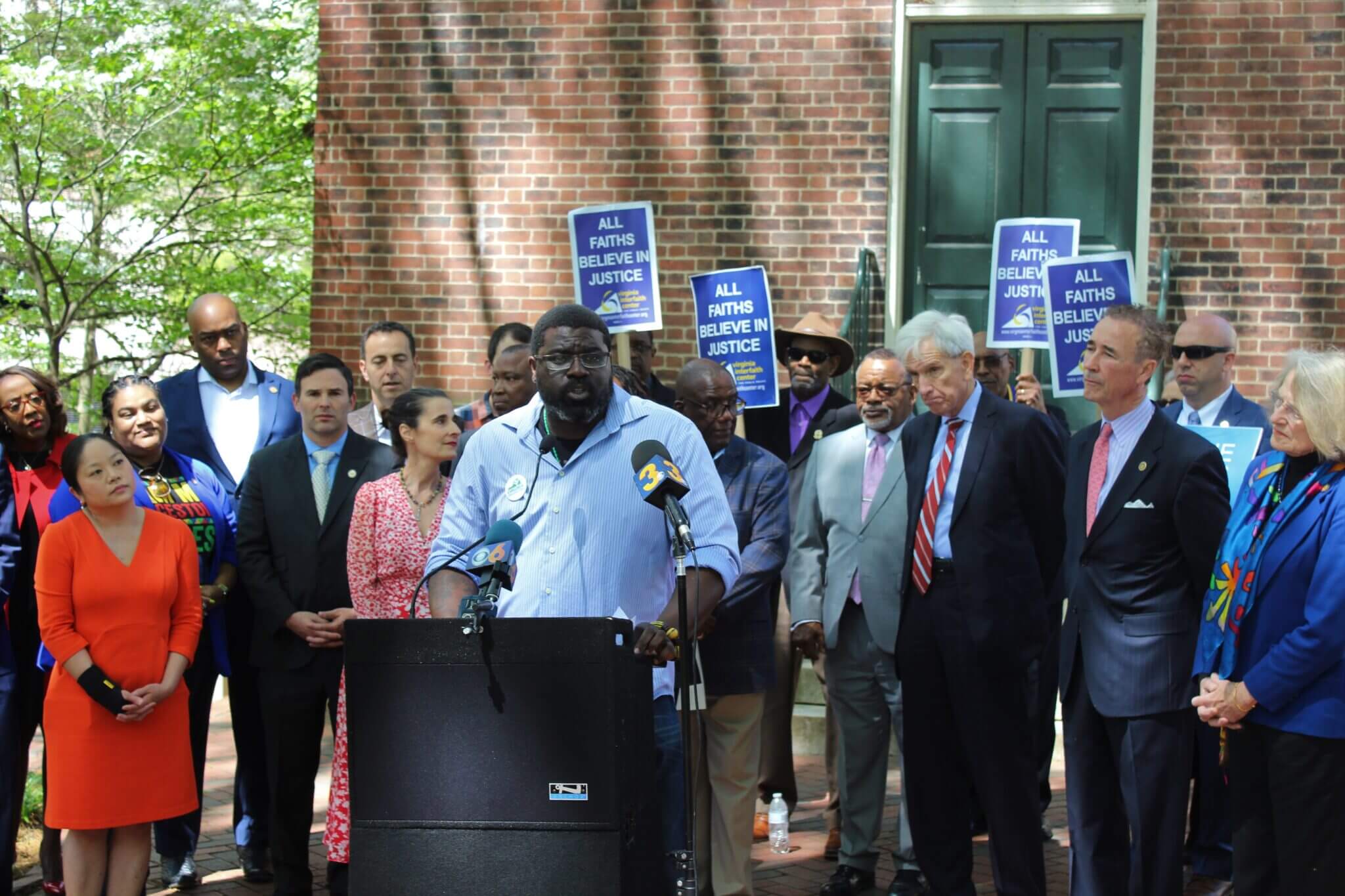
Duane Edwards, a former inmate who now works for Virginia Organizing, speaks at a news conference on Capitol Square in oppositoin to Gov. Glenn Youngkin’s rights restoration policies. (Graham Moomaw/Virginia Mercury)
by Graham Moomaw, Virginia Mercury
A key Democratic senator said he’s meeting with Gov. Glenn Youngkin Wednesday morning to discuss the governor’s stance on restoring voting rights to people with felony convictions.
The meeting comes as Democrats and progressive advocates continue to blast the administration’s slower pace of rights restorations and lack of clarity about its process.
“We’ve got to appeal to his heart,” Sen. Lionell Spruill, D-Chesapeake, said during a news conference at the Capitol after revealing he was granted an audience with the governor Wednesday morning to discuss the issue.
Many Democrats have been sharply critical of Youngkin’s reversal of a bipartisan trend of making rights restoration automatic for at least some offenders as they leave prison, a policy that began under the administration of former Republican Gov. Bob McDonnell and ramped up dramatically under Democratic Govs. Terry McAuliffe and Ralph Northam.
Youngkin administration now requires felons to apply to get their voting rights back
Virginia and Kentucky are the only two states with constitutional rules dictating that a felony conviction brings a permanent loss of voting rights unless the governor decides a person is worthy of regaining that right.
The strongly worded rebukes of Youngkin’s approach continued at Tuesday’s news conference, which more than a dozen Democratic General Assembly members attended.
House Minority Leader Don Scott, D-Portsmouth, referenced racist comments attributed to former Virginia lawmaker Carter Glass, who was quoted as saying the voting rules in the 1902 Virginia Constution he helped draft would “eliminate the darkey as a political factor in this state.”
“The progeny of Carter Glass sits up there in the governor’s mansion,” said Scott, who has a felony drug conviction but regained his rights to vote and hold public office under McDonnell. “And now he has decided on his own that he is judge and jury when it comes to restoration of rights.”
Youngkin’s office took exception to Scott’s comment.
“The comparison of the governor to a segregationist of Del. Scott’s own party is beneath a leader of Virginia’s General Assembly,” said Youngkin spokesman Rob Damschen.
The governor addressed the issue directly Tuesday while speaking to reporters in Petersburg, saying he was “excited” to meet with Spruill and have the opportunity “to listen to one another and exchange views.”
“The restoration of rights situation is one where our Constitution and a Supreme Court ruling in 2016 have made it very clear that what I have to do is give every formerly incarcerated Virginian an individual review,” Youngkin said. “And that’s what we’re committed to do. And it just hasn’t been happening. And so I wanted to come in and make sure we did this by the book.”
In 2016, the Supreme Court of Virginia overturned an executive order from McAuliffe that restored rights to more than 200,000 people at once, with the majority opining that governors do not have the power to issue blanket restorations for entire groups without an individual review of each person’s case.
Under Virginia’s system, the governor has broad leeway to set their own policy on rights restoration. Theoretically, a governor could refuse to restore rights to anyone, but recent Democratic governors have tried to make the process as automatic as possible so that people leaving incarceration regain the right to vote almost immediately.
In his first year in office, Youngkin restored rights to more than 4,300 felons, but criminal justice reform advocates say there’s been a noticeable slowdown in how many petitions are granted as well as a lack of transparency about what criteria the administration is using to make its decisions. During his four-year term, Northam restored rights to more than 126,000 people. McAuliffe approved more than 173,000 restorations.
After Spruill sent a letter seeking more information about what process the Youngkin administration is using to evaluate restoration requests, Secretary of the Commonwealth Kay Coles James responded with a letter of her own indicating the governor is reviewing each case individually and not automatically restoring rights to any subset of former inmates.
“The governor firmly believes in the importance of second chances for formerly incarcerated individuals as they look to become active members of their community and citizenry,” Coles James wrote in the March 22 response.
On Tuesday, Spruill characterized that response as inadequate, saying it mostly restated what the Constitution says on the matter and how the Supreme Court of Virginia has interpreted the rule.
“Hell, I know that,” said Spruill, who chairs the Senate Privileges and Elections Committee.
Asked if he’s considering any other ways to get more information from the administration, such as questioning the administration in a formal committee hearing, Spruill said his plan is to first meet with the governor.
“And then we’ll decide on it,” Spruill said.
Democrats have long pushed for a constitutional amendment scrapping the felon disenfranchisement rule, an idea some Republicans have started to champion as well. For the last two years, that effort has been blocked by the GOP-led House of Delegates.
At Tuesday’s news conference, voting rights advocates repeatedly said governors shouldn’t have the power to decide who can and can’t vote and indicated they intend to make the issue a recurring topic heading into this year’s General Assembly elections, which will decide majority control of both narrowly divided legislative chambers.
“Voting is a sacred right,” said Sen. Mamie Locke, D-Hampton. “Not a privilege as the governor would have you believe.”
Duane Edwards, a former inmate who now helps others navigate the rights restoration process through his work with left-leaning advocacy group Virginia Organizing, said that for the first time in a while, he’s now having to tell some ex-offenders they probably won’t get their rights back.
When he went into prison, Edwards said, he didn’t have children. Now he has two, he said, and being able to vote is part of shaping the community where he and his kids live.
“When they do something wrong, I say I forgive them, I’m not going to hold it against them every day. This is a message that we teach our kids,” Edwards said. “So why are we treating each other like this with these policies?”
Virginia Mercury is part of States Newsroom, a network of news bureaus supported by grants and a coalition of donors as a 501c(3) public charity. Virginia Mercury maintains editorial independence. Contact Editor Sarah Vogelsong for questions: [email protected]. Follow Virginia Mercury on Facebook and Twitter.
Politics

Biden marks Earth Day by announcing $7 billion in solar grants
The Biden administration on Monday announced the recipients of its Solar For All Program, a $7 billion climate program that aims to lower energy...

6 terrifying things that could happen if the Comstock Act is used to target abortion
Does 1873 sound like a really, really long time ago? Well, that’s because it is—but if Republicans and far-right anti-abortion activists have their...
Local News

Virginia verses: Celebrating 5 poetic icons for National Poetry Month
There’s no shortage of great writers when it comes to our commonwealth. From the haunting verses of Edgar Allan Poe, who found solace in Richmond's...

Join the fun: Recapping Family Literacy Night’s storybook adventures
When’s the last time you read a book aloud with a loved one? If it’s difficult to answer that question, then maybe it’s time to dust off that TBR...





